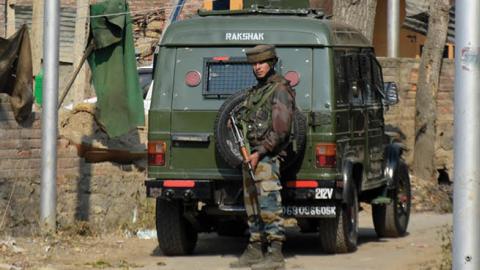In a recent speech at the first Islamabad Security Dialogue, Pakistan’s Chief of Army Staff, General Qamar Bajwa, spoke of the need for both Pakistan and India to “bury the past and move forward.” But before the global community expresses a collective sigh of relief at the prospect of a thaw in relations between the two countries, it is important to understand the caveats.
Bajwa put the onus on India to “create a conducive environment, particularly in occupied Kashmir.” Pakistan’s Prime Minister Imran Khan echoed these views by reiterating that “India would have to take the first step.” From India’s perspective, that might be a non-starter.
Still, within weeks of the announcement in February of a ceasefire along the Line of Control in Kashmir, there has been some movement on multiple fronts with renewal of sports ties and discussions on the Indus Water Treaty. Foreign Ministers of both countries are also expected to attend the upcoming Heart of Asia conference on Afghanistan in Dushanbe at the end of this month.
Of course, this is not the first time India and Pakistan have agreed to a ceasefire, and their checkered opening will certainly not be the last. If history is anything to go by, most agreements between India and Pakistan survive only till the next terror attack.
In the words of author and former Pakistan ambassador to the U.S., Husain Haqqani, India-Pakistan relations are akin to being on a treadmill. Over the last seven decades, relations between the two countries have gone through similar cycles. The starting point of the cycle is usually a war or — since the 1990s — a terror attack. This is followed by a period without any diplomatic engagement. Then, domestic or international compulsions cause one or the other side to reach out and ask for starting afresh. Talks re-start, some normalization occurs, and then another terror attack or border war leads the cycle repeating.
This time the Pakistani cast of characters is different. In the past, Pakistan’s civilian leaders reached out to their Indian counterparts. This time, it was not the Prime Minister but the Chief of Army Staff who first reached out — and the Indian side reciprocated.
For those asking why the ceasefire and subsequent events happened right now, the answers lie more in domestic reasons than international. Pakistan is under considerable pressure. The civilian government is weak and not interested in foreign policy.
The global perception of Pakistan as a country that supports jihadis/Islamist radical groups remains, and this hampers efforts to obtain economic assistance and grow the economy. The country has been on the UN FATF grey list for three years now, and that has deep economic ramifications.
While Pakistan has not been placed on the FATF blacklist, there is sufficient pressure from the U.S., many European countries, and India to keep it on the grey list. As the institution that in effect has dictated Pakistan’s foreign and domestic politics, the Army feels there is too much pressure on the country and that there is a need to alleviate that pressure.
However, there is no sign that the army has given up its strategic vision or view on India as an existential threat. It is simply seeking temporary reprieve from Indian pressure on Pakistan’s border, and international pressure on the country’s economy. If Pakistan is viewed as reaching out to India, that will lower the global pressure on Pakistan and buy the country some time and hopefully some economic assistance.
The Indian side is speaking with the Pakistan military because Delhi knows that at the end of the day, the Pakistani civilian leaders will not be able to guarantee any agreement unless the army backs it. India currently has a live border situation with China and would like at least one of the two borders to be cold.
India and Pakistan know that good relations would benefit them both, but there are reasons why that knowledge has not translated into a workable strategy for positive engagement. Those reasons will not disappear simply because of another ceasefire.
Since independence in 1947, Pakistan’s identity and foreign policy have been framed around India. A feeling of mistrust towards India and the insecurity about India’s larger size led Pakistan’s leaders and strategists to argue that India never accepted the creation of Pakistan and instead seeks to undo partition. Pakistan’s foreign and security policy is thus driven by a fervent desire to check ‘hegemonic’ India from achieving its nefarious aims in South Asia and beyond.
Every Indian Prime Minister, from Jawaharlal Nehru to Narendra Modi, has sought to improve relations with Pakistan based on the belief that it will lead to a peaceful neighborhood. There is consensus in India that a politically stable and economically integrated South Asia is in India’s national interest.
Only in recent years has a strong anti-Pakistan sentiment emerged in India, particularly in the aftermath of the 1999 Kargil conflict and the 2008 Mumbai terrorist attacks, both of which are reflective of a tendency on Pakistan’s part to use peace initiatives as an opportunity to launch attacks.
If terrorism is front and center for India in any dialogue, it is still Kashmir for Pakistan. If Pakistan is really interested in improvement of India-Pakistan relations, it will need to move beyond the ‘Kashmir first’ policy. But there are no serious takers for such thinking in Pakistan.
General Bajwa’s and Prime Minister Khan’s speeches reiterate that Pakistan is still unwilling to bite the bullet and accept that normalization of relations with India would require that Kashmir be placed on the back burner not just for now but possibly forever.
Things have changed on the Indian side, too, where national pride and anger over terrorism precludes any initiative involving what some refer to as ‘magnanimity towards Pakistan.’
For this ceasefire to last longer than a few weeks or months would require the Pakistani military to ensure control over the various Pakistan-based jihadi groups that focus on India and ensure no attacks take place.
India too would need to move beyond simply seeking to isolate Pakistan and come up with more options for dealing with its immediate neighbor — including discussions on Kashmir — but domestic politics in India appear to be moving in a different direction.
Read in The Hill



















